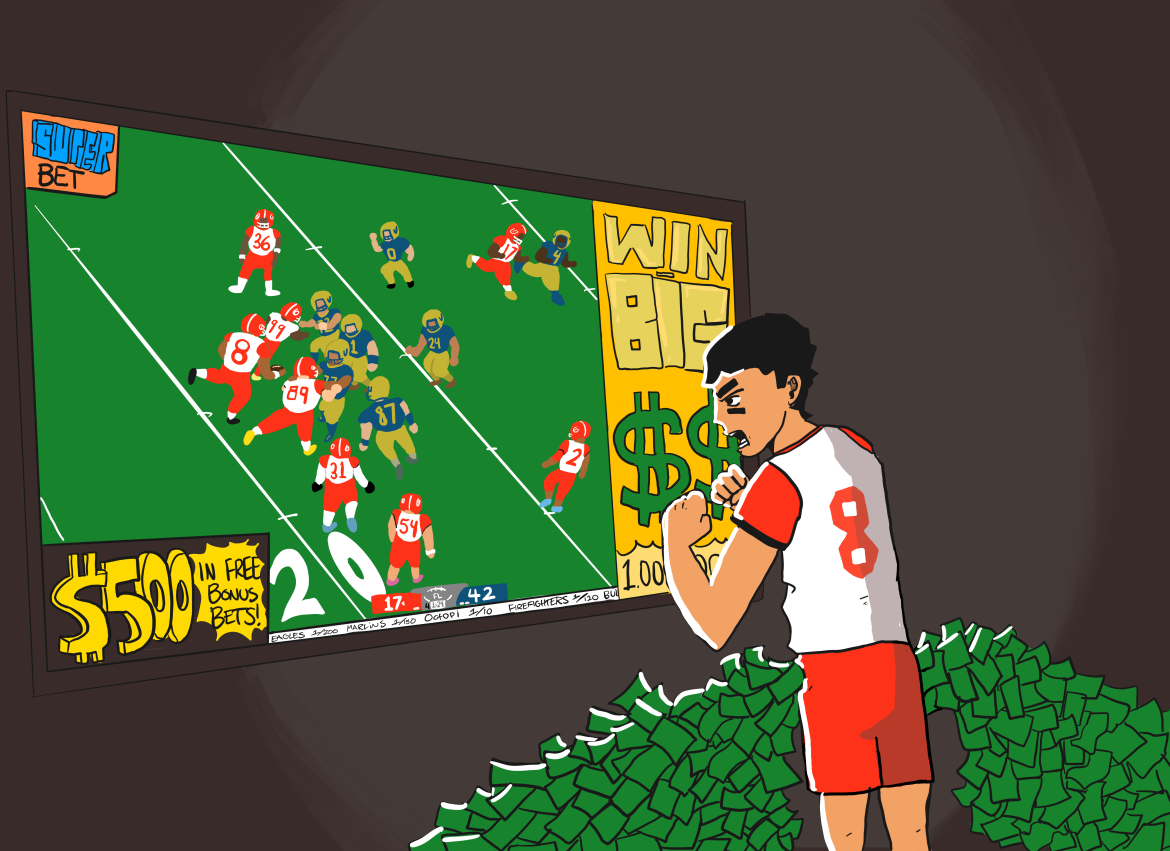A so-called sports fan cheers on a team he has bet on. Although sports gambling may be an entertaining habit in small doses, Sports Staffer Sam Harwell urged caution in betting. “Gambling can be pursued in urged caution in betting. “Gambling can be pursued in small amounts with few repercussions, but should be small amounts with few repercussions, but should be approached with caution,” Harwell wrote. Illustration by Sam Harwell
Sports Staffer Sam Harwell discusses the increase in usage of sports gambling apps and their negative impact on sports culture and society.
Three times. It’s Nov. 28, and the Miami Dolphins have been on Green Bay’s 1-yard- line three times in a singular game and failed to score a touchdown each time. They’re trailing, 30-17. But they just can’t get in the end zone, and they lose the game.
Any average fan would be disappointed, but some have gone above and beyond, and bet their entire paycheck that Miami would win. Now, not only are they devastated, but so is their wallet.
All because the fans fell for their trap. Do the phrases “Download BetMGM and get $100 dollars in free bonus
bets!”, “People who played DraftKings won over $10,000 dollars!”, or “With FanDuel, anything can happen!” sound familiar?
These betting companies hide the potential consequences of gambling behind their flashy advertisements framing sports gambling like some sort of game, with football players and celebrities endorsing the product. And it definitely works.
According to ESPN, in 2019, sports betting companies made $1 billion dollars on sport bets. In 2023, that number increased to $10.92 billion, and in 2024 that number skyrocketed to $40 billion.
The sports gambling craze has gotten to the point where gambling has gone airborne. In January 2025, sports betting app DraftKings proposed a deal with Delta Airlines to allow gambling while on flights, which is currently illegal in the U.S. ESPN has also made similar deals with gambling giant PENN Entertainment, turning what used to be a sports broadcasting network into a sports betting network, as well.
It’s even taken over restaurants, with establishments such as Buffalo Wild Wings and Dave and Busters partnering with gambling sports books. But besides the business, sports gambling is also a destructive and addictive habit. According to the Mental Health Foundation, long-term effects of gambling of any kind include low self-esteem, anxiety, and depression, as well as increased risk of suicidal thoughts. But is it dangerous if you’re doing it for fun?
Besides the business, sports gambling is also a destructive and addictive habit.
Clarke Central High School senior Quentin Makin has always been a fan of sports, more than the average person. So when he turned 18, he started placing bets on games with his friends.
“(Betting) definitely makes (sports) more interesting,” Makin said. “It’s fun, nothing getting in too extreme. It’s really just a fun hobby.”
Sports betting can be a good way to spend some money, as long as it’s in moderation, which is the case with students like Quentin. However, the risk is always there.
“People set their money limits different, and you can get carried away,” Makin said. “(Sports gambling) can hurt you if you’re not being careful about it, and it can become a stressor, instead of something that should be enjoyable.”
Sports gambling has become exceedingly popular in recent years, and, by the looks of it, will continue to do so.
There are serious dangers associated with gambling, but there are ways to combat addiction, such as the 24-hour gambling addiction hotline at 1-800-426-2537 or Gamblers Anonymous, a group dedicated to growing from shared gambling trauma. Further resources can be found on the National Council on Problem Gambling website.
Gambling can be pursued in small amounts with few repercussions, but should be approached with caution.
